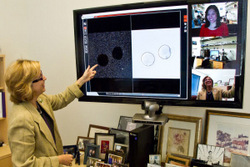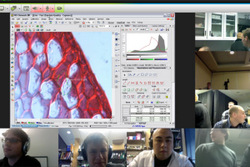
Imagine collaborating with researchers from across the country and being able to not only video conference with them, but also see the experiments they are conducting under microscopes in real time.
This technology, called iExperiment, is part of a suite of new applications developed by Northwestern University Information Technology (NUIT) and the Oncofertility Consortium. iExperiment is a portal where scientists can watch and participate in experiments that are taking place around the globe.
“A better way to do science is to share it in real time and have people look at the data as it is collected and to apply that knowledge in their own laboratories,” said Teresa Woodruff, PhD, Thomas J. Watkins Memorial Professor of Obstetrics and Gynecology and chief of the Division of Obstetrics and Gynecology-Fertility Preservation. “And that is a real paradigm shift in science.”
Each digital microscope in Woodruff’s follicle culture room has a camera that streams live video via Vidyo desktop conferencing software. This gives scientist access to the laboratory from any location around the globe, and allows them to watch experiments on their computers or mobile devices and communicate directly with the researchers.
Woodruff, also director of the Institute for Women’s Health Research, came up with the idea about two and a half years ago. Her lab was isolating human follicles and she had collaborators who she thought could benefit from having the information they were gathering.
“Our goal is to solve the problem of human follicle growth and egg maturation,” she said. “We think the most important part of our oncofertility program is to get to these endpoints which represent a solution for patients as quickly as possible. If we work in a traditional way, by ourselves, it will happen, but it will happen too slowly. So to ensure the pace and the quality of the research is as high as possible, we felt that a global collaboration was necessary.”

The Woodruff Lab collaborated with NUIT to implement the software and adapt existing video conferencing technologies to create iExperiment.
“When we identify a need that requires a technology solution, NUIT finds a way to create or adapt technology to get us to our goal. There hasn’t been a technological match for some ideas yet, but because we have this great collaboration, they are always on the lookout for that next big thing,” said Woodruff.
Woodruff’s team first demonstrated iExperiment at the 2010 Oncofertility Conference. In September 2011, the group launched the first Oncofertility 101 course, in which researchers from around the globe learn techniques used in the lab, such as in vitro follicle dissection.
“One of the things we will do is install the iExperiment software on their computers so when they go back home, they can continue to work with us from afar and share data as it is being discovered,” said Kate Timmerman, director of the oncofertility program. “Our trainees include graduate students, post-docs, professors, and investigators. People come from as close as Madison, Wisconsin, and as far as Austria, Australia, and South America.”
“Hopefully what we have done is catalyze the research so that instead of having to wait to see the results published, researchers can begin the next generation of work now rather than waiting until later. We think that is really going to mobilize reproductive health sciences in a significant way and really could mobilize all science activities,” said Woodruff.






